Managing researcher identity and name changes using ORCID
UK ORCID Jisc consortium event report
What were we interested in and why?
In the UK, Jisc leads a consortium of ORCID implementors in higher education, consisting of nearly 100 Universities, research organisations and a major funder. ORCID is an identifier for contributors to research and is intended to help with continuity of identity for researchers across time, disciplines and borders, including name changes. We know that researchers change their names for a variety of reasons. We wanted to find out more about how this is managed within scholarly communication systems. What happens within the organisations that employ researchers? Do researchers have good or bad experiences? Can ORCID help?
Given the role of our community in this landscape, we challenged ourselves to reflect on our experience and knowledge, to answer questions like:
- Are you aware of researchers or colleagues who have needed to change their name, and their reasons?
- Did the internal systems at your institution handle this well? Which other service departments or external systems would be involved?
- Would you know how to reply if you were asked whether ORCID can help in this scenario?
- What are the implications for the researcher and for the scholarly record?
If you are in a hurry, you can skip to the 2-minute version of this report.
What did we do?
We wanted to think about why researchers change their names and the impact that name changes may have on their career or output tracking opportunities, and the potential of technologies like ORCID ID and technical infrastructure to support their experiences. Although our main focus is on technology and infrastructure solutions, we are very aware that any thinking and discussion needs to be done in the context of social, policy and organisational concerns.
While preparing for our event, I put together this Miro Board to help explore relevant resources and questions. Miro is a whiteboard-like space that is available for collaborative and interactive exploration. It contains my capture of the background information – a bit like a mood board – and other content, information and comments added by our workshop participants.
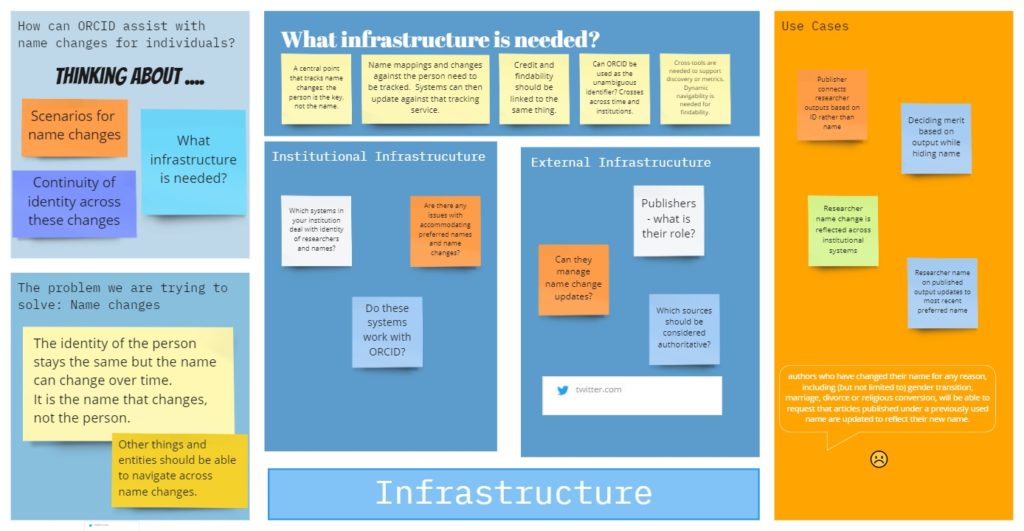
Link to the interactive Miro Board
We then came together in a workshop on the 17th of June 2021. The event was attended mainly by key contacts from our UK ORCID consortium members, joined by some external experts. During the event we use journey maps – you can see these in the Miro Board too. Journey maps are a visual tool to help us think about the researcher journey. We deconstructed the journey into 3 simple phases, the beginning, middle and end. We thought about what the researcher is experiencing (thoughts and feelings), the actions they take and their interactions (e.g. with parts of our services). This led us to consider the impacts and suggest parts of the journey that need most attention (e.g. pain points).
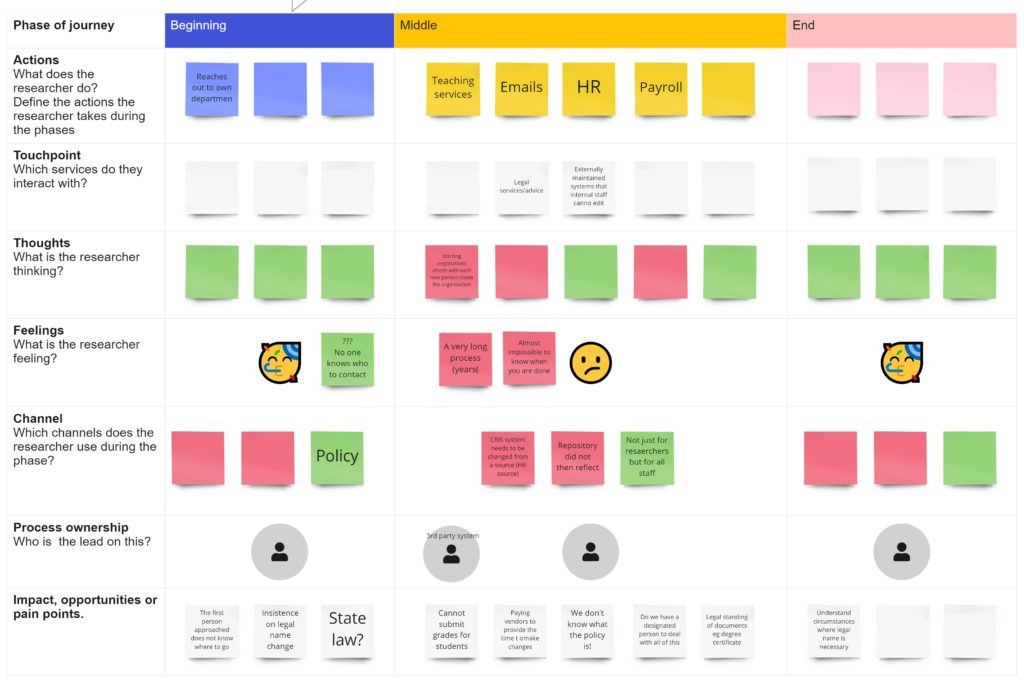
Explore the journey maps in the interactive Miro board
We concluded the event by voting on some of the pain points that need action – also done interactively through the Miro Board and captured there.
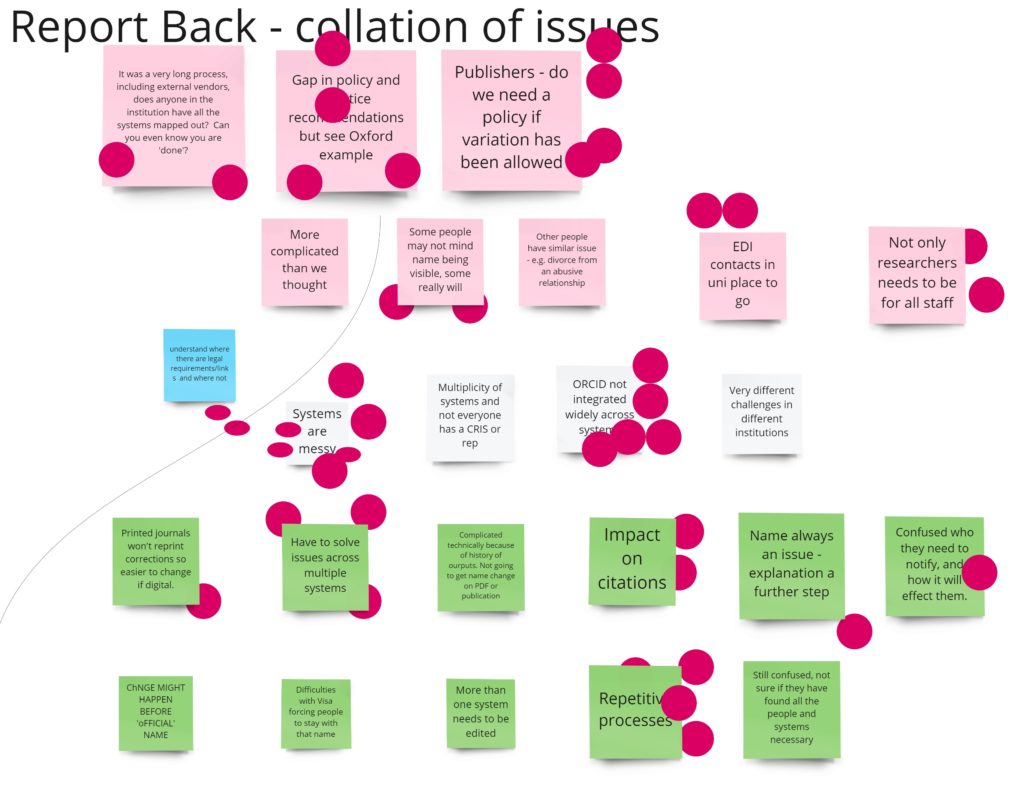
What did we learn?
Here is my summary of the key points that I have distilled from my learning during the preparation stage and the event discussion and contributions on the day.
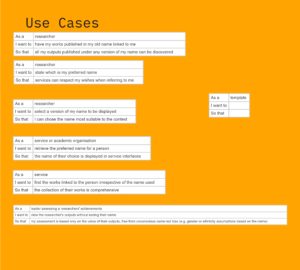
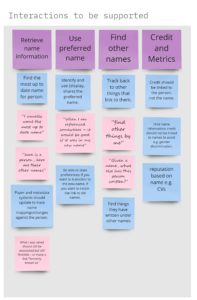
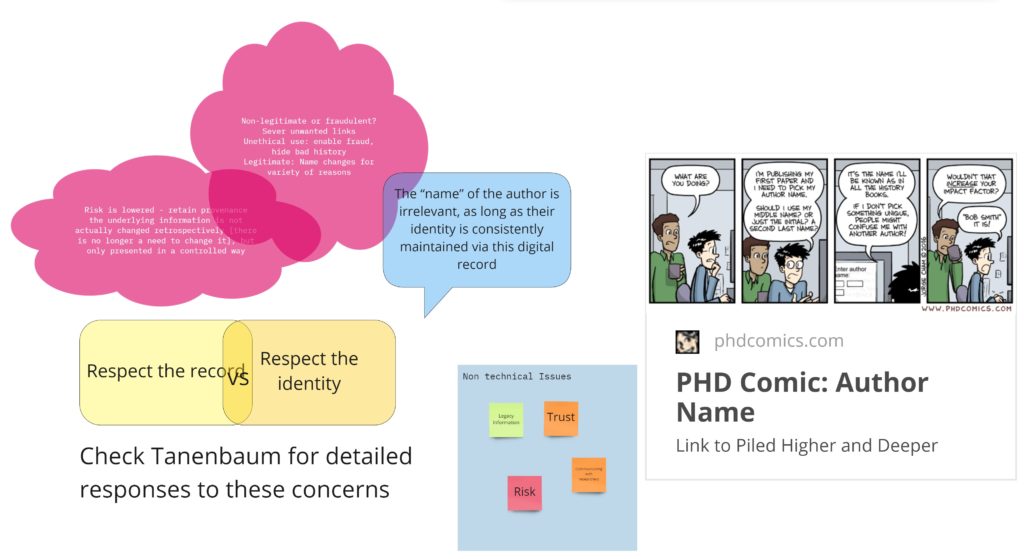
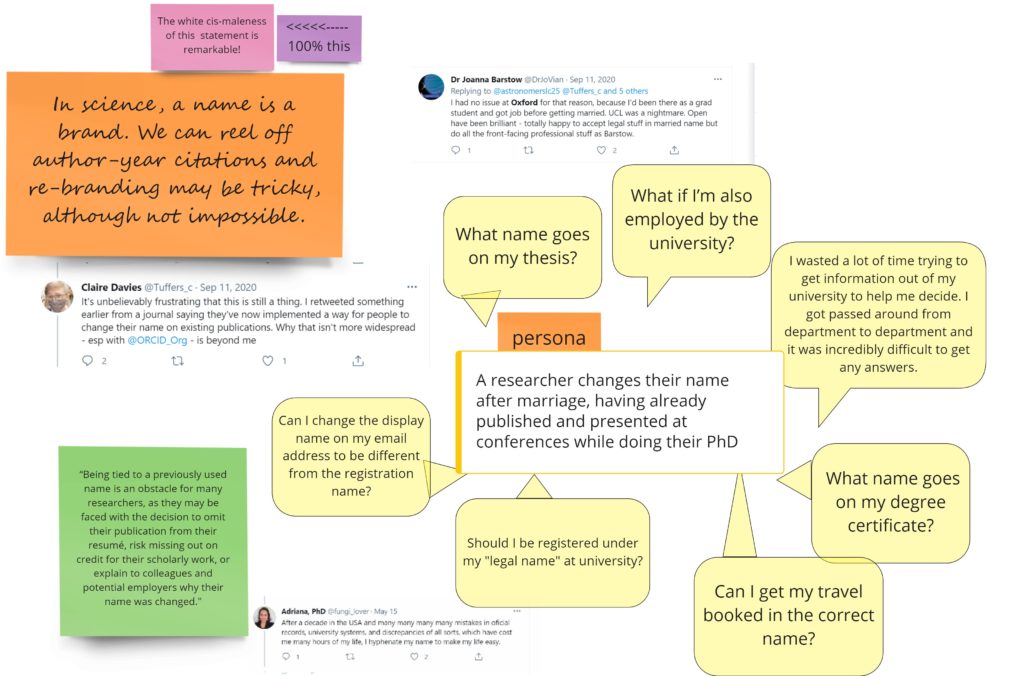
Researcher experiences
In one of the breakout groups, we heard directly from a researcher about the pain points in the journey of name changing. This was a very powerful contribution. If I was running a similar event in future, I would make a presentation by the researcher a key session available to all participants. Since it was part of the breakout, it was not recorded (which created a safe space for sharing) however it means the direct sharing of the experience was limited to a small number of participants. The first-person account made the challenges and difficulties very clear.
The reasons for name changes can be varied and include change of name by deed poll, marriage, remarriage, divorce, gender transition and use of pseudonyms. It is important to understand that the reasons for change include instances where an older name must no longer remain visible (including for safety reasons), but the works and outputs need to remain linked to the contributor across their corpus of works. In other cases, it is less critical that different versions of a name continue to be visible and can co-exist, but the need to link all the work in one corpus for reasons of reputation, citation and impact measurement is shared. Discoverability is a key driver for solving the name change problem. When considering possible solutions, it is important to be aware of the different scenarios that need to be dealt with and the possible consequences for researchers.
Resources that are generally available to understand the researcher experience when changing name include blog posts, articles and twitter comments. We used Science, Surnames and Marriage and Publishers: let transgender scholars correct their names to provide a suggested focus for the practical sessions in our workshop.
Whilst grouping experiences can be useful to work through similar-looking use cases, a case-by-case approach is also needed to make sure individual circumstances are carefully considered. Asking “do they want the previous name to be seen” could be a critical question in two scenarios – a transgender person who does not wish their status to be revealed by the existence of a deadname, or a person coming through a divorce from an abuser, who wants to dissociate from the abuser’s name. In both cases the association with the old name causes pain. But other aspects, for example the supporting legal processes and documentation, may be different.
One conclusion that came across strongly is that the experience for researchers trying to change their name and have this implemented across their employer and other external systems can be fraught with difficulties. Some of the organisational barriers reported include
- Lack of clarity about who to contact about name changes in the institution. The first person that you reach out to may not know.
- Needing to repeat the same information and explanations (and negotiations) multiple times, starting afresh with each different person or role encountered
- It is a very long and repetitive process (years).
- One example of the ‘reproduction of process’ was producing copies of any relevant certification multiple times.
- The change process requires the request to be made under the name that the person is trying to be removed from.
- It’s almost impossible to know when you are ‘done’ and that all systems and sources of information are up to date with your new name.
- Added complexity where one person has more than one role (e.g. both a researcher and a student) may mean needing to repeat requests or interactions under both roles.
- Repetition, confusion and lack of assurance appear to be typical. “Have I talked to the right people?” “Has the right outcome been achieved?”
I wasted a lot of time trying to get information out of my university to help me decide. I got passed around from department to department and it was incredibly difficult to get any answers.
Scientists Are Human Blog Post
Being tied to a previously used name is an obstacle for many researchers, as they may be faced with the decision to omit their publication from their resumé, risk missing out on credit for their scholarly work, or explain to colleagues and potential employers why their name was changed.
ACS policy announcement
Publisher policies
Publishers are starting to respond to requests from researchers to have their names changed in published materials and publishing systems. PLoS and the ACM are among publishers that have created and shared policies. Guiding principles and best practices are offered by COPE (Committee on publication ethics) – guidance for publishers is being prepared. A list of all publisher policies is being actively compiled. NISO is also working on recommended best practices, and there is a name change policy working group with a developing website.
Some other observations shared on publishing practices included
- Traditionally, variation in names is allowed by publishers, and historically there is little checking against legal documents and name versions. There appears to be a mismatch between the checking (especially checking against legal sources) that takes place when original names are used, compared to when there is a name change when suddenly (and contrary to previous practice) policy and legal documents are invoked.
- Scholarly record goes back a long way and one query that commonly arises is around changing historical record. Print and pdf versions are not as amenable to updating as digital versions.
These, and other discourse on publishing practices and responses are reasonably well-documented, and the above resources should be consulted. A white paper explores common concerns and provides rebuttals.
Institutional policies
At least some institutions are already working on policies or guidance that explain how name changes can be implemented in their systems and the various services that can deal with this. One example captured during the event is from the University of Oxford and at least one other university participant reported that a policy was nearing approval. A draft from UC Irvine can be viewed in the Miro board.
There is a need to understand the extent to which legal requirements will affect your policy and practice as some documents and names recorded in systems may have legal standing (eg. Records made or shared for taxation purposes, when the degree certificate is considered a legal document, travel bookings and even travel visas for foreign staff or students may impact use of names)
Do we have a designated person to deal with this?
Institutional infrastructure
- Which systems in your institution deal with identity of researchers and names?
- Are there any issues with accommodating preferred names and name changes?
- Do these systems work with ORCID? If yes, could they use ORCID to help with name management?
- Or could they share ORCID information with your institutional system that connects with the ORCID API?
Institutional infrastructure is complex, as shown in these presentation slides from a Jisc webinar in May 2021 on research management digital ecosystems. This is a list of systems mentioned during the workshop as dealing with a researcher’s name or identity (many researchers also carry out teaching duties): teaching services, email services, HR, payroll, repository, CRIS, CRM, thesis, degree awarding, student registers, profiles published on web systems, publisher platforms. Additionally, institutional systems are used alongside, or interact with, external services which are commissioned under various different arrangements and agreements.
It was not trivial to figure out which databases fed into each other and few admin staff seemed to know.
Scientists are Human blog post
There are multiple systems in use. Finding all the relevant systems can take a long time (not all systems are mapped as in the above example); many systems are not set up to use or handle ORCID IDs. Other system infrastructure factors – besides their number and complexity – identified in the meeting that add to the challenges or consequences of name changing include
- Some systems are externally maintained and internal staff are not able to edit them directly.
- Some external systems may require payment to effect a change.
- Some consequences of difficulties with systems can be quite extreme with impact on others e.g. no longer being able to submit grades for students.
- Some systems do currently use name search as a human searchable interface and may not support other search (such as one based on ORCID).
- System connection issues include systems which are disjointed and ones which have links but the links are unclear.
- Generally-speaking, systems may lack the facility to record name changes and reasons (if it is desirable to do so) and this metadata cannot be captured (perhaps helping to avoid repetition) except perhaps as added notes.
Role of ORCID
When our event was held in June 2021, ORCID did not have a published statement that articulated their position on supporting name changes in an equality and diversity context. However, in this Twitter thread from April they explained they were monitoring publisher name change policy developments, seeking participation in wider community working groups (like NISO), and although they did not yet have the specifics for the technical underpinnings, ORCID was committed to aims like maintaining the integrity of the scholarly record and avoiding unintended consequences of name changes (like a negative impact on citation counts). This position was largely echoed in this later Twitter thread in November
ORCID is frequently referred to as a key part of the solution and its use strongly encouraged by at least some publishers. For example, ORCID features heavily in the responses by PLOS to comments on their communication on name change policy Implementing name changes for published transgender authors. Researchers themselves do comment ‘Is this what ORCID is for?’ [add twitter link] although others ask whether ORCID is enough, since linking different names to one unique identifier cannot solve all concerns.
ORCID is slowly finding its place as part of the solution to the name in scholarly record dimension of equality, diversity and inclusion. The original aim of name disambiguation (distinguishing between two people with the same name) has slowly extended, and as ORCID say in their December 2021 blog post Five easy ways to get the most out of ORCID (for both researchers and organizations) as an organisation ORCID is currently part of the journey understanding how an identifier that lasts across name changes can support EDI “We are also learning that ORCID can help reduce the detrimental effects of name changes so researchers are no longer limited to the name they used when they began their career.”
By the end of 2021, ORCID had joined The Coalition for Diversity and Inclusion in Scholarly Communications (C4DISC) adopted their principles, and published a statement on their latest diversity, equity and inclusion work and commitments, which said
By virtue of the fact that we provide a name-independent person identifier for researchers, ORCID inherently encourages inclusivity and equitable treatment of those whose names are more likely to change over their careers, for example, transgendered people, and women in cultures where it is traditional for them to change names upon marriage.
ORCID statement on diversity
What’s next?
By starting this activity we wanted to work together with our community to identify gaps in technical infrastructure, policy or practice and what is needed to help fill those gaps (e.g. guidance, recommendations, policy changes, working groups, new services, agreed community norms or practices) and to move on to thinking which stakeholders need to take action, and at what level? Our first step was to start the discussion within our group of UK ORCID implementors, seeded by a review of current knowledge and practice, with pointers to available resources. Most of us were quite new to this discussion and as a community we needed to establish this baseline before we consider next steps and actions.
Key take-aways from the event
Our first overall take-away was that this topic and challenge is more complicated than first appears, “there is much more to discuss” and we have only managed to “scratch the surface” was a shared reaction across breakout groups.
Policy development and practice as well as solutions cannot be solely ORCID-and-researcher focused. Due to the remit of our support service as lead of the ORCID consortium, we approached the discussion with a focus on researchers. However, universities employ staff in many other roles, and would need to consider name changes for all roles that do not conduct research too.
I think ORCID can help for identity/name management in the (broad) publishing/outputs sphere. But internal institutional systems and their intersection with legal and financial concerns is probably out of scope.
Workshop participant
Barriers may be organisational or infrastructural.
Technology can only really be used to enact policy so that needs to come first.
Whilst examples are starting to emerge regarding policy and practice, some particular areas of difficulty need to be addressed urgently and include: giving clarity on who needs to be notified of changes, removing the repetitiveness in the process and generally reducing the burden on the researcher to make the process exhaustive.
Whilst examples are starting to emerge regarding policy and practice, some particular areas of difficulty need to be addressed urgently and include: giving clarity on who needs to be notified of changes, removing the repetitiveness in the process and generally reducing the burden on the researcher to make the process exhaustive.
Understanding the personal and varied experience of researchers and others in our organisations is key. One suggestion was for focus groups to further capture and record experiences, barriers and helpful practices.
There are multiple systems that deal with identity and names, and these are not only internal ones, some are externally owned or managed. Connections and dependencies between these systems are not only complex but sometimes also unclear, and ownership can be difficult to establish too. Many of the systems are not yet integrated with ORCID limiting the usefulness of ORCID as a solution.
ORCID is actively monitoring developments and activities in the equality, diversity and inclusion space; when it comes to using ORCID ID and registry to solve name-change problems, the specific technical approaches are still to be worked out. ORCID appears to be ready to become part of the solution. However, all the different name-change scenarios and use cases need to be mapped out, paying careful attention to the consequences for researchers in different name-change situations and their particular requirements. Delineating the boundaries within which ORCID is useful, and those in which it may be out of scope (e.g. outside the sphere of academic contributions) also appears to be important for higher education and research.
Sector-level guidance could be localized. Jisc could have a role here in helping facilitate sector-wide conversations. For example, focus groups could be run across the sector to document common pain-points, leading to checklists of areas that organisations need to consider; on the other hand organisation-specific focus groups could highlight any local practices or policies that are causing difficulties. “Having a map” of the systems and processes, how they link together and their connectors was generally considered necessary. Where these do not already exist, generic guidance could help suggest how to produce such a map and make to help make it comprehensive – map production would then need to be localised.
Lived experience is key and any future plans should be embedded and linked in taking actions that are considered most needed by those affected. More case studies would be one way to help capture this knowledge and priorities. Increasing institutional recognition of the issue (where it is not already on the agenda) would be needed so the different service partners and senior management support can be achieved. Furthermore, reference to the ongoing international efforts and forthcoming recommendations should provide the context.
COPE
Committee on Publication Ethics
COPE promotes ethical practices in publishing culture. Have a working group to develop guidance on author name changes for publishers and have published a guest editorial featuring five principles and guidance.
NISO
National Information Standards Organization
NISO is a nonprofit membership organization that identifies, develops, maintains, and publishes technical standards to manage information. In 2021 set up a working group to develop a recommended practice to update author name changes in the academic publication record after publication as a result of identity change.
NCPWG
Name change policy working group
Started off as a group looking at trans issues in publishing, offering support and information sharing, but has now evolved into looking at issues for other groups and considering institutional space. Looking at having more influence in shaping policy and building a website as a knowledge and resource base. Have suggested guiding principles for name change policies.
By sharing the outcomes of our localised workshop we want to reach out and open up the discussion and learning to the wider scholarly community in which our practice is positioned. We now have a collection of resources relevant to this topic collected before and during the event, which we are sharing through this blog post and can continue to build up through our community. Feel free to add any further suggestions in the comments. Our workshop identified some pain points – do you agree with these, are they different where you sit? Let us know in the comments.
“I see this conversation as a really important step towards thinking about what it means to imagine a platform for identity management that both addresses the needs for institutions to understand who people are, while also addressing the needs of individuals to assert agency over identities”
Workshop participant
Acknowlegdments
The report for this UK ORCID consortium was developed following a community activity with the participation of community members both from the UK ORCID consortium and expert guests who joined us on the day. Their contribution to the discussion and collation of resources is acknowledged with thanks. The content of the Miro board reflects the preparation work done prior to the workshop, and contributions made during and after the workshop.
Resources
Researcher views and experiences
Scientists are Human blog post: Science, Surnames and Marriage, August 2019 https://scientistsarehumans.com/2019/08/05/science-surnames-and-marriage/ retrieved 19th January 2022
Theresa Jean Tanenbaum Publishers: let transgender scholars correct their names. Nature 583, 493 (2020) doi: https://doi.org/10.1038/d41586-020-02145-3 https://www.nature.com/articles/d41586-020-02145-3
Johana Goyes Vallejos Two surnames, no hyphen: Claiming my identity as a Latin American scientist, Science, May 2021 doi: 10.1126/science.caredit.abj4464
https://twitter.com/DrJoVian/status/1304380922977026049
https://twitter.com/cldaviesastro/status/1304380004877381634
https://twitter.com/fungi_lover/status/1393215898777882625
Publisher Policies
Link to collection of policies https://twitter.com/JostMigenda/status/1385251825734098946
Direct link to spreadsheet of policies Twitter shortlink to spreadsheet
Example policies ACS ACS announcement ACM JSTOR
Tanenbaum, T. J. et al. (2021) ‘A vision for a more trans-inclusive publishing world: guest article’, COPE, 13 January. Available at: https://publicationethics.org/news/vision-more-trans-inclusive-publishing-world#digital%20record
COPE guidance regarding author name changes
DePaul, Amy Scientific publishers expedite name author changes. Nature July 2021 https://www.nature.com/articles/d41586-021-02014-7
Lilian Hunt LSE Blog For academic publishing to be trans-inclusive, authors must be allowed to retroactively change their names. September 2020
Emma Yasinski. The Scientist Publishers Develop Inclusive Name-Change PoliciesJuly 2020
Institutional policies
https://blogs.napier.ac.uk/open-access/name-change-policy-for-napiers-repository/
https://www.york.ac.uk/students/studying/manage/student-record/name-change/
https://www.gold.ac.uk/media/docs/gam/Student-Name-Policy-and-Procedures.pdf
https://www.york.ac.uk/it-services/accounts/change-name/
https://edu.admin.ox.ac.uk/changes-to-name-and-gender-records
Jisc Managing researcher identity and name changes using ORCID event
For consortium members the discussion and sharing of resources can continue with the consortium Teams community hosted by Jisc. Please contact help@jisc.ac.uk for the registration link to join the community or to enquire about consortium membership.
Two-minute summary
We organised an event for the UK ORCID consortium to learn more about the problems faced by researchers when they change their names, and to investigate how technologies like the ORCID identifier can help particularly in scholarly communication ecosystems.
Researchers change their names for a variety of reasons. Reasons include change of name by deed poll, marriage, remarriage, divorce, gender transition and use of pseudonyms.
It is important to understand the reasons for a name change as this may lead to different requirements. The need to be able to bring together a whole corpus of work is a common factor, and to avoid negative impact on reputation, impact and citation measurements; discoverability is a strong driver; however, in some cases different name versions can continue to co-exist, but in others an old name re-surfacing can have significant consequences (including ones of personal safety) for the researcher.
Organisational barriers for researchers who change their name are significant and include a lack of clarity on who to contact, dealing with a process that is very long and repetitive, and difficulty establishing when the task has been completed.
Systems to handle names at a research organisation are many, both internally to the institution and external ones either used by the university or within the wider ecosystem e.g. publisher and indexing systems.
Institutional policy is emerging with some UK university policies already becoming available. Institutions need to consider name changes and policies and systems that work for all staff, not only researchers and scholarly communication systems. Legal aspects also need to be addressed.
Publisher policy on name changes is growing with many publishers sharing name change processes and policies. A compilation of such policies is available.
There is a need to share sector-wide emerging practices and advice that can then be localised, in particular capturing and document the needs of individuals affected with institutional recognition to take on thinking about this topic.
ORCID is watching this space and monitoring developments, taking part in community efforts and considers itself well positioned to contribute to a solution, once the technical underpinnings have been worked out in the wider community.
Key community activities to monitor in this space include NISO, COPE and ncpwg (see panel in the main report).

1 Comment
[…] The following is the summary of consortium event report. You can read the full report on the UK ORCID Consortium blog. […]
Comments are closed.